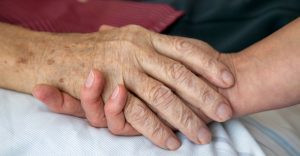As my friend lies dying…it’s not black and white
January 12th, 2017 | Published in Euthanasia; Suicide
“I support euthanasia.”
That’s what I would have said, without hesitation, until recently.
“People should be able to decide when they want to die,” I would have added, probably emphatically. “We make those decisions for pets, rather than see them suffer. Why shouldn’t people be free to choose?”
That was before I was called to the aged care facility about my friend, Eva. It was early on a Sunday morning, and she had been having unrelenting whole-body spasms for more than 24 hours. She couldn’t sleep, eat, or speak clearly and was exhausted, distressed, and not particularly lucid or rational.
The staff had called a doctor but, being Sunday, it was going to take a while. I said I would stay.
When Eva asked for help
It was a very long day, and the only coherent thing Eva said, several times, was: “I’ve had enough. What can you do? Help me.”

We stared at each other. I probably blinked first, despite Eva’s involuntary spasms. She’s asking me to help her die, I thought, she really is, she really wants it. She’s had serious kidney disease for years that causes painful oedema and ulceration of her legs, and this seizure-like development must be her last straw.
I looked directly at her and said, doing my best not to mumble: “I’m sorry, Eva. I wish I could help, but it’s not possible. We don’t have the means, and it’s not legal. I hate to see you like this, and I can be here, but that’s about it. Pathetic, I know, but that’s the truth.”
 I was sorry I couldn’t relieve her distress. But was I sorry I couldn’t kill her? No way. In fact I was realising in that moment what a huge thing it would be – to assist in someone’s suicide. It was also dawning on me that if euthanasia had been legal, I might have been the one who had to make the decision. I hold Eva’s medical power of attorney and, at that time, she was not competent.
I was sorry I couldn’t relieve her distress. But was I sorry I couldn’t kill her? No way. In fact I was realising in that moment what a huge thing it would be – to assist in someone’s suicide. It was also dawning on me that if euthanasia had been legal, I might have been the one who had to make the decision. I hold Eva’s medical power of attorney and, at that time, she was not competent.
This was all somewhat academic, given that euthanasia is not currently legal in Australia, and Eva’s terminal care plan (which I had scribed for her) could therefore not include such instructions.
The experience did, however, make me realise the gulf between supporting euthanasia in theory, and being involved in actual practice.
The ups and downs of palliative care
My previous clarity became even less sharp after Eva’s stay in hospital.
When she returned to the aged care facility, she was calm. Her status was by then officially palliative, which meant she was no longer being actively treated for her medical conditions and was being made as comfortable as possible.
The decision to shift to palliative care had fallen to me, as her medical power of attorney, and I felt deeply confident that it was what she would have done for herself if she had been competent at the time. The doctor who talked me through the decision was extraordinarily caring, patient, and helpful without pushing either way.
Unwelcome ambulance trips to hospital (a place she fears, that pretty much renders her mute) are now off the list. She is cared for in familiar surroundings, by familiar people, friends who visit can continue to do so, and she is still surrounded by other residents she already knows.
Eva has no family, having been adopted as a baby in pre-war Germany to parents who are now  long dead. I feel the responsibility keenly of being her key support person, and do what I can to piece together from things she says, and doesn’t say, how she is feeling about life, and death, without labouring the point.
long dead. I feel the responsibility keenly of being her key support person, and do what I can to piece together from things she says, and doesn’t say, how she is feeling about life, and death, without labouring the point.
It’s a rollercoaster and one of the biggest challenges of my life.
During one conversation she confided that when she finally went to sleep when the spasms stopped would have been a good time to die.
“Will I ever get out of this stupid bed?” she asked.
“What do you think?” I asked back.
“Sometimes yes, sometimes no,” she answered, clearly more optimistic than me.
On another occasion, she volunteered: “I’m still learning things all the time.”
This came from a conversation about corruption, a word she had only just learnt from one of her visitors. Such an Eva thing; often, over the years, when I visited, she would have something written down she wanted explained: a quote, a word, a headline.
So, I find myself wondering, as I try to make sense of these snippets, what if I had been able to help her die before palliative care started. It would probably have been a mistake, I realise. This way, she could die under peaceful circumstances, having been able to spend time with old friends.
“Lying here waiting to die”
Eva has been up and down over the palliative journey, but mostly peaceful, relatively pain-free, no longer spasming, and more coherent than when she was in crisis. She no longer begs to die, although she did say to me one day “I’m just lying here waiting to die.”
“How does that feel?” I asked.
“Not as bad as I thought it would,” she said. “It is the way it is.” We then talked about acceptance, and she agreed that’s where she was at.
As time passes, though, she becomes weaker, and the indignities of dependence loom larger.
Eva is the archetypal independent woman, a trait I would guess goes right back to childhood. She hates ‘causing trouble’. But the daily griefs weigh heavily on her spirit – not being able to do anything for herself, being showered and fed, wearing a nappy, not being able to reach out for and hold a glass of water, feeling infantilised (it’s pretty much inevitable at that level of dependence) and being talked about rather than with (again probably inevitable when staff are working in pairs to bathe her, for example).
Each small loss is a mini-death.
There’s more than relief of pain
I have come to realise that when people like Ian Haines (oncologist) talk about effective palliation as an alternative to euthanasia, they are missing a large part of the point.
There is way more in the balance than simply being pain-free.
Eva is alive, but has no life.
She lives on opiates and sugar-water, unable to get out of bed. She can move her forearms in a shaky kind of way, and shift her head slightly from side to side, but she can’t sit herself up. Her eyes, when open, stare fixedly at you (I always take a break first) or at the ceiling. She is, in a sense, entombed in her own body, in a way described by a man in the UK who has launched his own legal challenge for the right to die.
She can’t think or, at least, has trouble articulating. Sometimes she looks at me as if she’s about to say something, but it usually fades before she can get it out.
On a recent visit, she was clearly happy to see me, and reached for my hand. We sat like that for some time. She had that look, as if about to say something, and I returned it with a questioning gaze. She eventually managed:

“I’m glad and sad.”
“What’s making you sad?” I asked (guessing the gladness was about the visit).
“I can’t talk to you anymore.”
“Yay,” I said feeling that loss, knowing her as I did to be an interesting, interested, original, intelligent and curious person. “We’ve had some good conversations over the years. And some good arguments.”
Gentle nod from the pillow.
It is now three months since palliative care began. I am starting to wonder if there is any point any more, and I wonder if Eva may be wondering as well. This is a conversation she would engage in – if she could, but her capacity to speak is increasingly limited, and her abstract thinking increasingly lacking. Her comment to me about being glad and sad was the most complex she has made of recent times.
I have to say, again, that I am glad not to be in the position of making the decision about the timing of her death. Mainly, I think, because I realise how hard it would be to make the call at the time she would choose.
It’s different making the decision for a pet. Or, is it? A dog can’t exactly talk back to you, although they do communicate nonverbally. A person might be able to talk back, although Eva becomes less able as time goes by.
If I trust to my heart, and allow empathy to rule, perhaps it will be okay? After all, it was me who basically made the decision about her transition to the aged care facility, and to palliative care (in my role as medical power of attorney) and both of those decisions still feel right. Eva has definitely been grateful for them after the fact (much to my huge relief).

It’s not black and white
As the nurse in ‘Last Cab to Darwin’ says, “it’s not black and white”. She was caring for Rex who had been diagnosed with terminal stomach cancer and drove across Australia from Broken Hill (in New South Wales) to Darwin (in the Northern Territory) to pursue the possibility of legal euthanasia.
He pulled out at the last minute, surprising everyone, including himself, with the strength of his will to eke out the time left to him.
I understand, Rex. It’s not black and white…Joan Beckwith.
………………………………………………….
Scroll down for comments
First-time comments have to be moderated. I try to complete that process, and respond, within 24 hours. Do check back.
Social justice is for everyone (previously 2020socialjustice) is also on Facebook (click here)
And Twitter (click here)



All i can say Joan is ❤empathy❤ 😖😪
Thanks, Deb. And if/when there is a basis in your own experience, the empathy is reciprocal.
Wow. Thanks for this thoughtful and sensitive piece Joan.
As I grow older this is something I think about a lot.
Appreciate the feedback, Cherry. It’s been a challenging journey, but I’m glad to have been able to do it. And, yes, there’s a lot to think about and all of it pretty hard, and made harder I think by the current illegality of euthanasia that limits the choices people can make for themselves. At the same time, having watched “Last Cab to Darwin” it’s also clear that the decisions people make ahead of the time might not hold when it comes to the crunch, which is fine as long as the person is competent, but harder if someone else is trying to fulfil their wishes.